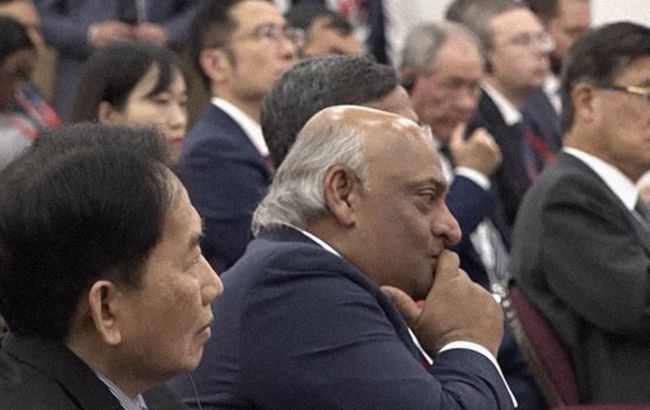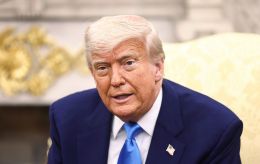The largest Russian oil trader: what is known about Murtaza Lakhani
 The largest Russian oil trader: what is known about Murtaza Lakhani (photo: wsj.com) /
The largest Russian oil trader: what is known about Murtaza Lakhani (photo: wsj.com) /
What is known about the founder and CEO of Mercantile & Maritime, who is considered the largest trader of Russian oil — in our report.
63-year-old billionaire Murtaza Ali Lakhani holds British and Canadian citizenships. He entered the top circles of global commodity trading decades ago by taking risky bets. Back in the early 1990s, Lakhani helped Iraqi dictator Saddam Hussein bypass the oil embargo. As later revealed by a UN investigation, Murtaza Lakhani — then a representative of the trading company Glencore — was engaged in selling Iraqi oil. According to the UN report, his role was to transport bags of cash for the trading firm and deliver them to the Iraqi diplomatic mission in Geneva.
Lakhani amassed significant wealth precisely by violating the oil embargo against Iraq. Later, he was accused of using similar schemes to bypass sanctions against Iran and Venezuela.
Lakhani grew close to the Russian oil elite by selling “Kurdish oil” after Kirkuk was liberated from ISIS. Since 2017, he has acted as an intermediary in Iraqi Kurdistan export deals for several global companies, including Rosneft and Mercantile & Maritime. His partnership with the Russian state oil company also extended to Venezuela.
Until 2022, Lakhani’s cooperation with Rosneft was carried out through the Mercantile & Maritime Group.
Moreover, until 2020 he sponsored Trident Network — a fleet network involved in deceptive crude oil shipping schemes in Venezuela together with the state oil company PDVSA and Rosneft. Currently, Trident Network is controlled by Venezuelan oil trader Antonio Luis Gonzalez Morales, whose ties to Lakhani remain unclear to this day.
Mercantile & Maritime Group purchased oil from the Russian company in Venezuela and resold it on global markets — often back to Rosneft itself, according to documents published in Western media. Profits were split 50/50, and financing was provided by Rosneft’s bank VBRR.
In emails reviewed by SourceMaterial, Rosneft Trading employees appear to discuss deals in coded language.
“Payment for Voronezh oil cannot be made in cash; we cannot use any banking channel,” a Rosneft representative wrote.
After Russia’s full-scale invasion of Ukraine in February 2022, the partnership between Lakhani and Rosneft CEO Igor Sechin reached a qualitatively new level.
According to a Bloomberg investigation published in 2023, Rosneft’s president, Mercantile & Maritime, and one of Putin’s closest allies — Igor Sechin — celebrated New Year in Dubai on a luxury yacht docked near the Palm Jumeirah islands. One of the most important guests on board was Murtaza Lakhani. The Bloomberg report stated that in 2022, Sechin devoted much time to developing schemes to circumvent oil sanctions, and Lakhani was one of those actively helping him. Lakhani created an entire network of oil trading and shipping companies in Dubai to distribute Russian oil worldwide.
The same investigation named specific companies within Lakhani’s network. The most well-known among them are Tejarinaft FZCO, Fossil Trading FZCO, and Amur II – FZCO (Lakhani’s lawyers told Bloomberg that these companies have nothing to do with him.)
Bloomberg, citing four different sources, including a person who previously worked with Lakhani, reported that these firms purchased tens of millions of barrels of Russian oil within a year, loaded them onto tankers from the shadow fleet, and sold them in India and China.
According to two sources and email correspondence reviewed by Bloomberg, Lakhani’s influence was so significant that Rosneft employees were regularly advised to consult him for instructions instead of conducting deals independently.
According to Volza — a service that tracks export-import operations in about 80 countries — since the start of Russia’s full-scale invasion of Ukraine, just one of Lakhani’s companies in the UAE — Amur Trading SA — acquired 369 oil consignments from five suppliers before early 2025. The suppliers were Rosneft and its subsidiaries.

In 2023, Tejarinaft FZCO became Rosneft’s second-largest client, purchasing an average of 244,000 barrels of oil per day.
How has Lakhani managed to violate oil embargoes imposed by the UN and Western countries against Iran, Iraq, Venezuela, and Russia for decades while avoiding sanctions?
In 2023, The Wall Street Journal, citing its sources, reported that the US Department of Justice was “closely monitoring” his activities and considering imposing sanctions against him. However, Lakhani has so far managed to remain “untouched.”
Finally, in January 2024, the US Office of Foreign Assets Control (OFAC) imposed sanctions on 13 ships linked to Lakhani’s operations. However, the lack of actions against the rest of his fleet raises questions about the effectiveness of current sanctions aimed at deterring Vladimir Putin’s war efforts.
Lakhani has also strengthened his ties in Washington and London. For example, during the UK’s 2019 election campaign, he donated £500,000 to the Conservative Party’s election fund through his London-based subsidiary, Mercantile & Maritime UK Ltd. At the time, his long-time partner Igor Sechin and Rosneft were already under British sanctions.
Lakhani’s connections and influence help him find ways to return tankers to the shadow fleet even when they fall under Western sanctions.
Western experts call these tactics a “cat-and-mouse game”: sanctioned tankers are fully or partially repainted, frequently renamed, and moved between jurisdictions, enabling them to continue transporting Russian oil.
As reported by the Polish edition Warsaw Point, the tanker Sensus, owned by one of Lakhani’s companies and listed by OFAC since January 2024, loaded oil at Venezuela’s PDVSA terminal in the Amuay Bay from January 21 to 25, 2025.
A few days later, on January 30, 2025, after passing Venezuela’s coast, Sensus performed a ship-to-ship oil transfer with the tanker Consul (IMO 9204805), which is under US sanctions.
According to Marine Traffic data, both ships were next to each other for 47 hours off the coast of Puerto La Cruz, Venezuela. Shortly after, Consul docked in Puerto La Cruz. From February 1, 2025, it turned off its AIS transponder, hiding its route — a common practice when trying to conceal a vessel’s movements.
Also, at the beginning of 2025, one of Lakhani’s shadow fleet tankers, Khalasi (IMO 9293997), made several trips to Russian ports.
The oil tanker Katy (IMO 9323326), owned by a recently registered Lakhani shell company in the UAE, was spotted in Russian ports Taman in June 2024 and Vanino in December 2024, according to Equasis data. Another Lakhani tanker, Uriel (IMO 9336517), left Lome (Togo) on January 1, 2025, and arrived at Ust-Luga (Russia) on January 26, 2025, according to Marine Traffic.
According to Ukrainian intelligence services, the tanker CLYDE, part of Lakhani’s shadow fleet, has been involved in exporting oil from Russia’s Nakhodka port to China since January 2025. This port houses a Rosneft terminal.
This same tanker was involved in exporting Russian oil and petroleum products from the port of Tuapse in 2023 and 2025. In January 2023, it transported over 58,000 tons of oil from this Russian port. The Tuapse port hosts a production complex owned by the sanctioned Russian company Rosneft — the Tuapse Refinery with a marine terminal. The shipper was Amur Trading FZCO, and the consignee was Tejarinaft FZCO, registered on April 25, 2022.
Another tanker from Lakhani’s shadow fleet — SEAL — was repeatedly observed between January and April 2025 off Crimea’s coast, in the Kerch Strait, and at the Novorossiysk terminal. In 2023, this tanker exported over 30,000 tons of gas oil (a mixture of crude oil and condensate) from Russia’s Tuapse port, delivering the cargo to Turkish company Tüpraş’s refinery. The shipment was organized through Tejarinaft.
Lakhani’s shadow fleet also includes the tanker JAG (previously known as Farmosa Falcon, Junior G, Sino Pacific, and others). Since early 2025, it has regularly appeared near Feodosia port in Crimea and off the Russian Black Sea ports. In 2023, Tejarinaft FZCO became Rosneft’s second-largest client, purchasing an average of 244,000 barrels of oil per day.
How has Lakhani managed to violate oil embargoes imposed by the UN and Western countries against Iran, Iraq, Venezuela, and Russia for decades while avoiding sanctions?
In 2023, The Wall Street Journal, citing its sources, reported that the US Department of Justice was “closely monitoring” his activities and considering imposing sanctions against him. However, Lakhani has so far managed to remain “untouched.”
Finally, in January 2024, the US Office of Foreign Assets Control (OFAC) imposed sanctions on 13 ships linked to Lakhani’s operations. However, the lack of actions against the rest of his fleet raises questions about the effectiveness of current sanctions aimed at deterring Vladimir Putin’s war efforts.
Lakhani has also strengthened his ties in Washington and London. For example, during the UK’s 2019 election campaign, he donated £500,000 to the Conservative Party’s election fund through his London-based subsidiary, Mercantile & Maritime UK Ltd. At the time, his long-time partner Igor Sechin and Rosneft were already under British sanctions.
Lakhani’s connections and influence help him find ways to return tankers to the shadow fleet even when they fall under Western sanctions.
Western experts call these tactics a “cat-and-mouse game”: sanctioned tankers are fully or partially repainted, frequently renamed, and moved between jurisdictions, enabling them to continue transporting Russian oil.
As reported by the Polish edition Warsaw Point, the tanker Sensus, owned by one of Lakhani’s companies and listed by OFAC since January 2024, loaded oil at Venezuela’s PDVSA terminal in the Amuay Bay from January 21 to 25, 2025.
A few days later, on January 30, 2025, after passing Venezuela’s coast, Sensus performed a ship-to-ship oil transfer with the tanker Consul (IMO 9204805), which is under US sanctions.
According to Marine Traffic data, both ships were next to each other for 47 hours off the coast of Puerto La Cruz, Venezuela. Shortly after, Consul docked in Puerto La Cruz. From February 1, 2025, it turned off its AIS transponder, hiding its route — a common practice when trying to conceal a vessel’s movements.
Also, at the beginning of 2025, one of Lakhani’s shadow fleet tankers, Khalasi (IMO 9293997), made several trips to Russian ports.
The oil tanker Katy (IMO 9323326), owned by a recently registered Lakhani shell company in the UAE, was spotted in Russian ports Taman in June 2024 and Vanino in December 2024, according to Equasis data. Another Lakhani tanker, Uriel (IMO 9336517), left Lome (Togo) on January 1, 2025, and arrived at Ust-Luga (Russia) on January 26, 2025, according to Marine Traffic.
According to Ukrainian intelligence services, the tanker CLYDE, part of Lakhani’s shadow fleet, has been involved in exporting oil from Russia’s Nakhodka port to China since January 2025. This port houses a Rosneft terminal.
This same tanker was involved in exporting Russian oil and petroleum products from the port of Tuapse in 2023 and 2025. In January 2023, it transported over 58,000 tons of oil from this Russian port. The Tuapse port hosts a production complex owned by the sanctioned Russian company Rosneft — the Tuapse Refinery with a marine terminal. The shipper was Amur Trading FZCO, and the consignee was Tejarinaft FZCO, registered on April 25, 2022.
Another tanker from Lakhani’s shadow fleet — SEAL — was repeatedly observed between January and April 2025 off Crimea’s coast, in the Kerch Strait, and at the Novorossiysk terminal. In 2023, this tanker exported over 30,000 tons of gas oil (a mixture of crude oil and condensate) from Russia’s Tuapse port, delivering the cargo to Turkish company Tüpraş’s refinery. The shipment was organized through Tejarinaft.
Lakhani’s shadow fleet also includes the tanker JAG (previously known as Farmosa Falcon, Junior G, Sino Pacific, and others). Since early 2025, it has regularly appeared near Feodosia port in Crimea and off the Russian Black Sea ports.
In February 2023, this tanker exported nearly 55,000 tons of Russian oil from Tuapse port. The shipper was Amur Trading FZCO, the consignee — Tejarinaft FZCO. This tanker was also involved in an incident posing an environmental threat: on February 10, 2025, due to technical failure, a fuel oil spill occurred during bunkering while anchored near Ambarlı, close to Istanbul.
In July 2023, a Lakhani representative told The Wall Street Journal that the businessman and all companies in which he has a stake no longer trade Russian oil. However, all the facts listed above tell a different story.
Moreover, Lakhani was recently an active participant in Putin’s St. Petersburg International Economic Forum. There, the businessman stated that he continues to do business in Russia, “considering the country an important market with high potential.”
Thus, MM Group, owned by Lakhani, operates not only in Fujairah (the eastern emirate in the UAE, where Lakhani plans a $600 million mega-project), but also in sanctioned Russia.

